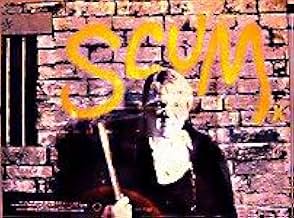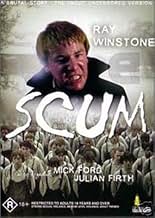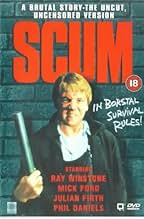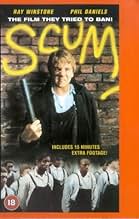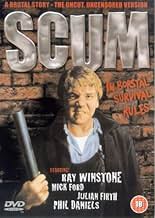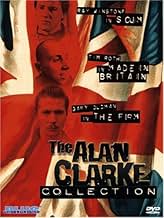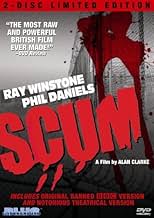NOTE IMDb
7,5/10
14 k
MA NOTE
Le récit sans concession de la vie dans un centre de détention pour mineurs britannique dans les années 70.Le récit sans concession de la vie dans un centre de détention pour mineurs britannique dans les années 70.Le récit sans concession de la vie dans un centre de détention pour mineurs britannique dans les années 70.
- Réalisation
- Scénario
- Casting principal
Philip DaCosta
- Jackson
- (as Philip Da Costa)
Avis à la une
Scum is an unforgiving portrayal of both physical and psychological abuse of the British borstal system; 1 hour and 30 minutes. The movie explores the borstal's hierarchy, analyzing both the wardens and the inmates ' actions and responsibilities, asking who is the worst. As Carlin (Ray Winstone) joins the borstal, the hierarchy is shattered. Carlin says he's looking for' no trouble,' but he's just as pugnacious or even more skullduggerous than the others. Scum describes the angry resentment of inequality in' correctional' institutions, much like' Cool Hand Luke' or' One Flew Over The Cuckoo's Nest.' Personally, I find few things worse than power abuse, whether in an institution or in a family. I'm sure that many would agree with me on that, and then make Scum an engrossing, resonant, and uncomfortable watch for everyone. Archer's protagonist, an articulate and apparently committed vegetarian who's out to make life difficult for the screws, delivers fragments of Roy Minton's script that beautifully examine the process and the angry men who staff these institutions-" Even though you've spent your life in jail, you're still just a simple cop. Now, who's got the stick for that? Us. Who's paying for that every day. Scum achieves what it aims to accomplish through convincing performance and blunt realism: portraying the reprehensible conditions of terrorism, discrimination and bribery in these institutions. One might wonder if the movie exaggerated these circumstances, but in 1982 government abolished the borstal scheme, replacing it with' Youth Custody Centres.' I assume it speaks volumes for the reputation of Scum.
Scum (the screenplay) was originally banned in 1977 - the year it was made - on the instructions of the BBC who had commissioned it. This was on the grounds of it being both too realistic in its presentation and simultaneously a work of fiction. The film follows the progression of three boys at borstal (prison for males ages 11-16) from arrival to the social dominance of one of them. It's a blackly humorous and scathing study of the (physical *and* mental) violence inherent in any social system, and particularly in the 'justice' system.
The screenplay was remade as a feature film in 1979, starring most of the original cast and featuring most of the original script, although a couple of scenes (featuring sexual abuse, though physical and racial abuse were deemed acceptable...) were presumably cut from the script because they wouldn't pass even the BBFC censor.
The original screenplay has subsequently been shown on UK television once. I happened to have the video running. With a high-quality tape in it. Lucky, that! It compares very favourably to the film, though the film format appears inferior (lower budget at the BBC), the quality of the performances is possibly better.
Scum is one of the most important screenplays to have been made, and shown, on British television, because it reveals the changing attitudes of the censors, and the nature of political censorship in the UK.
The film itself does not reveal this history.
The screenplay was remade as a feature film in 1979, starring most of the original cast and featuring most of the original script, although a couple of scenes (featuring sexual abuse, though physical and racial abuse were deemed acceptable...) were presumably cut from the script because they wouldn't pass even the BBFC censor.
The original screenplay has subsequently been shown on UK television once. I happened to have the video running. With a high-quality tape in it. Lucky, that! It compares very favourably to the film, though the film format appears inferior (lower budget at the BBC), the quality of the performances is possibly better.
Scum is one of the most important screenplays to have been made, and shown, on British television, because it reveals the changing attitudes of the censors, and the nature of political censorship in the UK.
The film itself does not reveal this history.
It is the late 70's and the borstal system is in full effect in England. To one such institution a young man by the name of Carlin is sent. Though ostensibly there for reform and education, the brutality of the place and its inhabitants (wardens and inmates alike) is more conducive of violence than rehabilitation. Facing daily beatings and constant subjugation, Carlin soon realises that he must rise up the pecking order if he wants any kind of respect or security, and that the best way to do that is through thuggery. Whether or not Carlin will conquer the borstal, or be destroyed by the place, remains to be seen in Alan Clarke's uncompromising, unforgettable 'Scum.'
'Scum' is a cutting treatise against borstals and those who ran them, which must have shocked audiences when it was released. It was not until the passing of The Criminal Justice Act of 1982 that borstals were officially shuttered across the UK, so the film was a most contemporary excoriation in 1979. Clarke had actually filmed 'Scum' two years earlier, for the BBC'S Play For Today series. It was deemed too unremitting for television, so it was rewritten, the same cast (largely) were assembled- as well as a new crew- and 'Scum' was reshot and released as the full-length feature discussed here now.
'Scum' is a tough film, one that is immensely affecting and unpredictable. The tale is bleak and harrowing, full of uncomfortable moments of persecution and ferocity. Written by Roy Minton, the story portrays the system of borstal to be a deeply flawed one that does more harm than good, led by brutes and disinterested stooges who believe that mercilessness is a positive attribute. The children have no hope of amelioration when trapped in that vicious, defunct system. The savagery they engage in is a barbaric but understandable, inevitable cry of frustration against the detachment and callousness with which they are treated.
The film is shot by cinematographer Phil Meheux, who has worked on movies ranging in quality and subject matter from 'The Long Good Friday' to 'Beverly Hills Chihuahua.' His work for 'Scum' is strikingly natural and gritty. He captures the starkness of the institution and its grounds with his documentary-style camera work masterfully, reinforcing the aura of cold nastiness which surrounds and envelops the inmates. Mike Porter's unembellished production design must also be mentioned, as it is understated work that is most notable, making the locations look lived-in and true-to-life. Additionally, Michael Bradsell's tight editing keeps the film running smoothly at a fast, even pace; ever building in intensity towards an explosive finale.
The great Ray Winstone stars as Carlin, delivering an intense, towering performance that is captivating and frightening both. One of his first acting roles, he performs with an ease and power unmatched by the rest of the cast, dominating the movie completely. Never once do you feel that Winstone is acting on screen, he inhabits the character of Carlin as if by birth-right. Playing him like a young Richard III and Reggie Kray combined, Winstone showcases seemingly boundless depth, energy and ability; leaving an indelible impression on the viewer.
Winstone's supporting cast don't let him down, each and all delivering strong performances, with a few particularly of note. Mick Ford plays a fellow inmate named Archer, who believes in pacifism, and Julian Firth stars as another, the introverted, ill-fated Davis. Both impress with their emotional range and perspicuity. John Judd and Philip Jackson star as two of the wardens, both playing sadistic egocentrics with real verve and panache. Judd is especially sinister, and his seedy grin will no doubt linger in the mind long after the credits have rolled on 'Scum.'
Uncompromising and unforgettable, Alan Clarke's 'Scum' is a powerful piece of cinema that holds a mirror up to society; reflecting back a cruel, cold and very real vision of life in the borstal system. Featuring strong performances all round- including a commanding central one from Ray Winstone- as well as striking visuals, the film impresses on nearly every level. It is shockingly violent and sadly realistic, making it hard to watch; but also thoroughly impossible to ignore.
'Scum' is a cutting treatise against borstals and those who ran them, which must have shocked audiences when it was released. It was not until the passing of The Criminal Justice Act of 1982 that borstals were officially shuttered across the UK, so the film was a most contemporary excoriation in 1979. Clarke had actually filmed 'Scum' two years earlier, for the BBC'S Play For Today series. It was deemed too unremitting for television, so it was rewritten, the same cast (largely) were assembled- as well as a new crew- and 'Scum' was reshot and released as the full-length feature discussed here now.
'Scum' is a tough film, one that is immensely affecting and unpredictable. The tale is bleak and harrowing, full of uncomfortable moments of persecution and ferocity. Written by Roy Minton, the story portrays the system of borstal to be a deeply flawed one that does more harm than good, led by brutes and disinterested stooges who believe that mercilessness is a positive attribute. The children have no hope of amelioration when trapped in that vicious, defunct system. The savagery they engage in is a barbaric but understandable, inevitable cry of frustration against the detachment and callousness with which they are treated.
The film is shot by cinematographer Phil Meheux, who has worked on movies ranging in quality and subject matter from 'The Long Good Friday' to 'Beverly Hills Chihuahua.' His work for 'Scum' is strikingly natural and gritty. He captures the starkness of the institution and its grounds with his documentary-style camera work masterfully, reinforcing the aura of cold nastiness which surrounds and envelops the inmates. Mike Porter's unembellished production design must also be mentioned, as it is understated work that is most notable, making the locations look lived-in and true-to-life. Additionally, Michael Bradsell's tight editing keeps the film running smoothly at a fast, even pace; ever building in intensity towards an explosive finale.
The great Ray Winstone stars as Carlin, delivering an intense, towering performance that is captivating and frightening both. One of his first acting roles, he performs with an ease and power unmatched by the rest of the cast, dominating the movie completely. Never once do you feel that Winstone is acting on screen, he inhabits the character of Carlin as if by birth-right. Playing him like a young Richard III and Reggie Kray combined, Winstone showcases seemingly boundless depth, energy and ability; leaving an indelible impression on the viewer.
Winstone's supporting cast don't let him down, each and all delivering strong performances, with a few particularly of note. Mick Ford plays a fellow inmate named Archer, who believes in pacifism, and Julian Firth stars as another, the introverted, ill-fated Davis. Both impress with their emotional range and perspicuity. John Judd and Philip Jackson star as two of the wardens, both playing sadistic egocentrics with real verve and panache. Judd is especially sinister, and his seedy grin will no doubt linger in the mind long after the credits have rolled on 'Scum.'
Uncompromising and unforgettable, Alan Clarke's 'Scum' is a powerful piece of cinema that holds a mirror up to society; reflecting back a cruel, cold and very real vision of life in the borstal system. Featuring strong performances all round- including a commanding central one from Ray Winstone- as well as striking visuals, the film impresses on nearly every level. It is shockingly violent and sadly realistic, making it hard to watch; but also thoroughly impossible to ignore.
I have seen this film once, and that should be enough for many people, yet they probably will have an urge to see it again and see the actors who are now making bigger, slicker movies (Cat off Red Dwarf in Blade 2 and Ray Winstone in everything!)
As it is about people around my age, this film hit me even harder. The rape scene counts as being the most sickening scene in movie scene history, yet it is all integral to the story. It is extremely bloody, racist and yet moving and heartbreaking. Ray Winstone is a cruel revelation as a top dog,a sympathetic yet violent hoodlum. Never been better since, I think.
The film moves at a breakneck speed and never seems to sag. I don't know what those employed at a borstal will think of it, but it would probably make them think more of the broken-down urchins as human.
A hard film to like, but even harder to forget. If I was rating it, a 3/5. I think I would give it a five if it wasn't so stomach-churningly realistic. Violence in films can be entertaining, but on no account this time.
As it is about people around my age, this film hit me even harder. The rape scene counts as being the most sickening scene in movie scene history, yet it is all integral to the story. It is extremely bloody, racist and yet moving and heartbreaking. Ray Winstone is a cruel revelation as a top dog,a sympathetic yet violent hoodlum. Never been better since, I think.
The film moves at a breakneck speed and never seems to sag. I don't know what those employed at a borstal will think of it, but it would probably make them think more of the broken-down urchins as human.
A hard film to like, but even harder to forget. If I was rating it, a 3/5. I think I would give it a five if it wasn't so stomach-churningly realistic. Violence in films can be entertaining, but on no account this time.
I'd had the opportunity to watch Scum a long time before I actually did, and I was always turned off it by the very sensationalist box and taglines. I've never been a fan of "The film they tried to ban" and similar phrases being used as advertisement for a film, so when I sat down to watch the film today I was very surprised.
It doesn't need phrases like that to advertise it - it's bleak and horrific, and should be advertised as a serious drama rather than some kind of exciting gore-fest. As well as being powerful and thought provoking, it's gripping too, and you won't feel bored when watching it. Although there is a lot of stuff crammed in there, and some scenes are very prolonged, at just over and hour and a half it's the perfect length to achieve what it sets out to do. This is one film you won't be bored watching.
I'm actually surprised that this film doesn't have more of a recognition or following nowadays, and isn't seen in the last light as Kubrick's "A Clockwork Orange" and Lindsay Anderson's "If...".
It doesn't need phrases like that to advertise it - it's bleak and horrific, and should be advertised as a serious drama rather than some kind of exciting gore-fest. As well as being powerful and thought provoking, it's gripping too, and you won't feel bored when watching it. Although there is a lot of stuff crammed in there, and some scenes are very prolonged, at just over and hour and a half it's the perfect length to achieve what it sets out to do. This is one film you won't be bored watching.
I'm actually surprised that this film doesn't have more of a recognition or following nowadays, and isn't seen in the last light as Kubrick's "A Clockwork Orange" and Lindsay Anderson's "If...".
Le saviez-vous
- AnecdotesCarlin was originally a Glaswegian, but was changed into a Cockney when Alan Clarke saw a then-unknown Ray Winstone walk in a unique way.
- GaffesAll borstal inmates were subject to the same mandatory short-back-and-sides haircut, yet a vast array of hairstyles are shown throughout the film, including afros.
- Versions alternativesNorwegian cinema version was cut in the rape scene and the suicide scene. Later video versions are uncut.
- ConnexionsFeatured in The South Bank Show: Keith Jarrett/Scum (1979)
- Bandes originalesDirty Last Night
(uncredited)
Music by John Dickson and Elfed Hayes
De Wolfe Music Ltd
Meilleurs choix
Connectez-vous pour évaluer et suivre la liste de favoris afin de recevoir des recommandations personnalisées
- How long is Scum?Alimenté par Alexa
Détails
- Date de sortie
- Pays d’origine
- Site officiel
- Langue
- Aussi connu sous le nom de
- Scum más allá de la degradación
- Lieux de tournage
- Sociétés de production
- Voir plus de crédits d'entreprise sur IMDbPro
Box-office
- Budget
- 250 000 £GB (estimé)
- Montant brut aux États-Unis et au Canada
- 6 461 $US
- Week-end de sortie aux États-Unis et au Canada
- 1 948 $US
- 18 juin 2017
- Montant brut mondial
- 6 461 $US
- Durée
- 1h 38min(98 min)
- Mixage
- Rapport de forme
- 1.66 : 1
Contribuer à cette page
Suggérer une modification ou ajouter du contenu manquant


